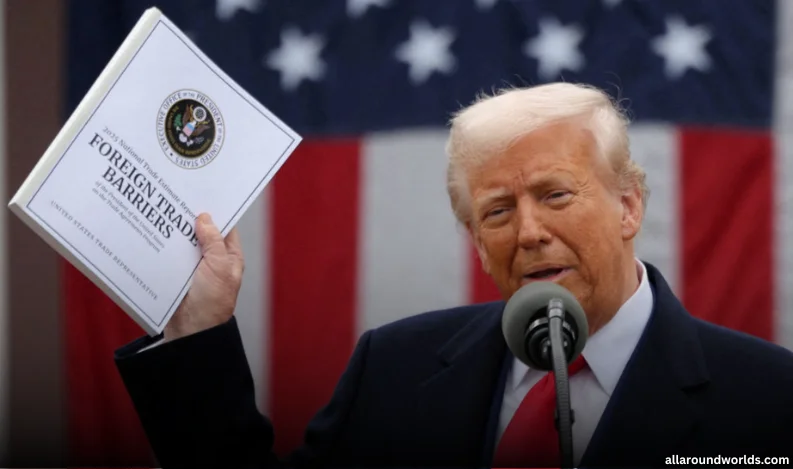
Trump Tells Americans to 'Hang Tough' as Sweeping US Tariffs Take Effect
In a defiant message to Americans and the global markets, US President Donald Trump has urged the nation to "hang tough" as sweeping 10% baseline tariffs officially came into force on Saturday, sending shockwaves through international economies and igniting widespread protests across the United States.
The tariffs—now affecting all US imports—have triggered alarm among allies including the UK, France, and Germany, while Beijing has launched an immediate and aggressive retaliation, deepening fears of a prolonged global trade war.
Markets Plunge Amid Escalating Trade Tensions
All three major US stock indexes tumbled more than 5% on Friday, with the S&P 500 falling nearly 6%, capping the worst trading week since the COVID-19 crisis in 2020. The UK's FTSE 100 followed suit, recording its sharpest drop in five years. Asian and European exchanges, including in France and Germany, also closed lower amid global uncertainty.
President Trump dismissed the market turmoil, calling it the beginning of an "economic revolution" that the US is poised to win. In a post on Truth Social, he said,
“Hang tough, it won’t be easy, but the end result will be historic.”
He described the tariffs as a necessary step to restore balance in global trade and strengthen American manufacturing.
China Responds with Mirror Tariffs, Files WTO Complaint
China, the largest foreign target of Trump’s tariff campaign, swiftly responded with its own set of 34% tariffs on US imports, mirroring the American move. On Friday, Beijing also lodged an official complaint with the World Trade Organization, accusing the United States of weaponizing tariffs and stifling China’s economic growth.
In a stern statement, China’s foreign ministry warned the US against undermining its development rights and called for an end to what it labeled “economic coercion.”
Protests Erupt Across the US Against New Policies
As the tariffs took effect, tens of thousands took to the streets in Washington DC, New York, and other cities. Organizers reported over 1,200 coordinated demonstrations nationwide—making it the largest single-day protest against President Trump and Elon Musk since their joint reforms were unveiled.
Demonstrators voiced concerns over economic inequality, tariff-driven inflation, and sweeping government changes that critics say expand executive power beyond constitutional limits.
While the White House has not officially commented, photos emerged showing President Trump holding up a copy of the New York Post, open to a bold headline challenging China’s retaliation: “China: Yeah? Try These Tariffs Out.”
UK and EU Push Back, Warn of Economic Fallout
British Prime Minister Sir Keir Starmer and French President Emmanuel Macron held emergency calls over the weekend, with both leaders agreeing that a trade war would be harmful to all parties. However, they also emphasized that “nothing should be off the table,” signaling potential retaliation.
In the UK, automotive giant Jaguar Land Rover announced it would pause shipments to the US, citing the need to review new trading terms and pricing strategies.
The EU, expected to be hit with a 20% levy beginning April 9, is considering coordinated responses. Elon Musk, now heading the Department of Government Efficiency (Doge), floated the idea of a “zero-tariff” zone between Europe and North America. Musk made the comments while en route to meet with Italian ministers to discuss economic cooperation.
More Tariffs on the Horizon
The current 10% tariffs are only the beginning. President Trump has signaled that by April 9, goods from nations deemed “worst offenders” in trade imbalance will face tariffs of up to 50%. The EU and China are likely to be among the hardest hit.
In his first term, Trump had dismissed a proposed Transatlantic Trade and Investment Partnership with the EU. While threats of tariffs on European vehicles were dropped in 2018, today’s re-escalation raises new concerns.
Looking Ahead: A Shifting Global Order
With trade alliances under pressure, supply chains disrupted, and consumer prices projected to rise, governments across the globe are bracing for long-term consequences. The coming weeks may determine whether diplomacy can rein in rising tensions—or whether the world is headed toward an entrenched era of protectionism and economic division.



Recent Comments:
No comments yet.